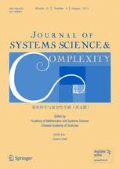Abstract
This work studies the orthogonal decomposition of the incomplete-profile normal finite game (IPNFG) space using the method of semi-tensor product (STP) of matrices. Firstly, by calculating the rank of the incomplete-profile potential matrix, the bases of incomplete-profile potential game subspace (\((\cal{G}^{\Omega}_{P})\)) and incomplete-profile non-strategic game subspace (\((\cal{N}^{\Omega})\)) are obtained. Then the bases of incomplete-profile pure potential game subspace (\((\cal{P}^{\Omega})\)) and incomplete-profile pure harmonic game subspace (\((\cal{H}^{\Omega})\)) are also revealed. These bases offer an expression for the orthogonal decomposition. Finally, an example is provided to verify the theoretical results.
Similar content being viewed by others
References
Aydogmus O, Discovering the effect of nonlocal payoff calculation on the stabilty of ESS: Spatial patterns of Hawk-Dove game in metapopulations, Journal of Theortical Biology, 2018, 442: 87–97.
Samadi A H, Montakhab A, and Marzban H, Quantum Barro-Gordon game in monetary economics, Physica A-Statistical Mechanics and Its Applications, 2018, 489: 94–101.
Taghizadeh A, Kebriaei H, and Niyato D, Mean field game for equilibrium analysis of mining computational power in blockchains, IEEE Internet of Things Journal, 2020, 7(8): 7625–7635.
Zhang X, Hao Y Q, and Cheng D Z, Incomplete-profile potential games, Journal of the Franklin Institute-Engineering and Applied Mathematics, 2018, 355(2): 862–877.
Deng L, Fu S H, and Zhu P Y, State feedback control design to avoid players going bankrupt, Asian Journal of Control, 2019, 21(6): 2551–2558.
Xiao Y F and Dougherty E R, The impact of function perturbations in Boolean networks, Bioinformatics, 2007, 23(10): 1265–1273.
Li H T and Wang Y Z, Minimum-time state feedback stabilization of constrained Boolean control networks, Asian Journal of Control, 2016, 8(5): 1688–1697.
Rosenthal R W, A class of games possessing pure-strategy Nash equilibria, International Journal of Game Theory, 1973, 2(1): 65–67.
Monderer D and Shapley L S, Potential games, Games and Economic Behavior, 1996, 14(1): 124–143.
Marden J R, Arslan G, and Shamma J S, Cooperative control and potential games, IEEE Transactions on Systems, Man, and Cybernetics, Part B: Cybernetic, 2009, 39(6): 1393–1407.
Yaziciǒglu A Y, Egerstedt M, and Shamma J S, A game theoretic approach to distributed coverage of graphs by heterogeneous mobile agents, Estimation and Control of Networked Systems, 2013, 4(1): 309–315.
Liang Y L, Liu F, and Wang C, Distributed demand-side energy management scheme in residential smart grids: An ordinal state-based potential game approach, Applied Energy, 2017, 206: 991–1008.
Heikkinen T, A potential game approach to distributed power control and scheduling, Computer Networks, 2006, 50(13): 2295–2311.
Marden J R, State based potential games, Automatica, 2012, 48(12): 3075–3088.
Wang X, Xiao N, Wongpiromsarn T, et al., Distributed consensus in noncooperative congestion games: An application to road pricing, Proceedings of the 10th IEEE International Conference on Control and Automation, 2013, 1668–1673.
Candogan O, Menache I, and Ozdaglar A, Flows and decompositions of games: Harmonic and potential games, Mathematics of Operations Research, 2011, 36(3): 474–503.
Cheng D Z, Liu T, Zhang K Z, et al., On decomposed subspaces of finite games, IEEE Transactions on Automatic Control, 2016, 61(11): 3651–3656.
Wang Y H, Liu T, and Cheng D Z, From weighted potential game to weighted harmonic game, IET Control Theory & Applications, 2017, 11(13): 2161–2169.
Pan Y N, Fu S H, and Zhao J L, Weighted potential incomplete-profile games, IEEE Access, 2020, 8: 67408–67415.
Cheng D Z, Qi H S, and Zhao Y, An Introduction to Semi-Tensor Product of Matrices and Its Applications, World Scientific, Singapore, 2012.
Meng M, Lam J, and Feng J E, Stability and stabilization of Boolean networks with stochastic delays, IEEE Transactions on Automatic Control, 2019, 64(2): 790–796.
Li H T, Xie L H, and Wang Y Z, On robust control invariance of Boolean control networks, Automatica, 2016, 68: 392–396.
Zhu S Y, Lu J Q, Liu Y, et al., Output tracking of probabilistic Boolean networks by output feedback control, Information Sciences, 2019, 483: 96–105.
Qi H S, Wang Y H, Liu T, et al., Vector space structure of finite evoulutionary games and its application to strategy profile convergence, Journal of Systems Science & Complexity, 2016, 29(3): 602–628.
Li C X, Xing Y, and He F H, A strategic learning algorithm for state-based games, Automatica, 2020, 133: 108615.
Mei S W, Liu F, and Xue A C, Semi-Tensor Product Method in Power System Transient Analysis, Tsinghua University Press, Beijing, 2010 (in Chinese).
Wang G R, Wei Y M, and Qiao S Z, Generalized Inverses: Theory and Computations, Science Press, Beijing, 2018.
Cheng D Z, On finite potential games, Automatica, 2014, 50(7): 1793–1801.
Author information
Authors and Affiliations
Corresponding author
Additional information
This work was supported by the Natural Science Foundation of Hebei Province under Grant Nos. F2021202032, A2019202205, and the Cultivation of Postgraduate Students Innovation Ability of Hebei Province under Grant No. CXZZSS2021045.
Rights and permissions
About this article
Cite this article
Dai, X., Wang, J. & Xu, Y. Orthogonal Decomposition of Incomplete-Profile Finite Game Space. J Syst Sci Complex 35, 2208–2222 (2022). https://doi.org/10.1007/s11424-022-1019-6
Received:
Revised:
Published:
Issue Date:
DOI: https://doi.org/10.1007/s11424-022-1019-6



